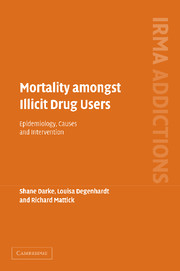Book contents
- Frontmatter
- Contents
- Acknowledgements
- List of tables
- Chapter 1 Why illicit drug-related deaths matter
- Chapter 2 The global epidemiology of illicit drug use
- Chapter 3 Mortality amongst illicit drug users
- Chapter 4 Mortality and drug overdose
- Chapter 5 Illicit drug use and disease
- Chapter 6 Mortality and suicide
- Chapter 7 Mortality and trauma
- Chapter 8 Reducing drug-related mortality
- Chapter 9 Summary and conclusions
- References
- Index
Chapter 4 - Mortality and drug overdose
Published online by Cambridge University Press: 30 September 2009
- Frontmatter
- Contents
- Acknowledgements
- List of tables
- Chapter 1 Why illicit drug-related deaths matter
- Chapter 2 The global epidemiology of illicit drug use
- Chapter 3 Mortality amongst illicit drug users
- Chapter 4 Mortality and drug overdose
- Chapter 5 Illicit drug use and disease
- Chapter 6 Mortality and suicide
- Chapter 7 Mortality and trauma
- Chapter 8 Reducing drug-related mortality
- Chapter 9 Summary and conclusions
- References
- Index
Summary
Introduction
The current chapter examines mortality attributable to drug overdose, the dynamics of which are still poorly understood. The two main drug classes implicated, and the ones upon which the most work has been conducted, are opioids and cocaine. Fatal overdoses from amphetamine toxicity, and from methylenedioxymethamphetamine (MDMA) and other so-called “party drugs”, are less well documented. In any discussion of overdose mortality, it is also clearly important to examine the related issue of non-fatal overdose. Non-fatal overdose is a far more common occurrence than fatal overdose, and is associated with a range of serious sequelae.
Rates of overdose
Opioid overdose is a major cause of premature death among heroin users (European Monitoring Centre for Drugs and Drug Addiction, 2004; US Department of Health and Human Services, 2005), and there have been strong trends internationally for the rates of such deaths to have increased dramatically in recent decades (Coffin et al., 2003; Drucker, 1999; Hall et al., 2000; Hickman et al., 2003; Preti et al., 2002; Steentoft et al., 1996). By way of example, between 1985–1995 the percentage of all deaths in Britain attributed to opioid overdose increased from 0.02% to 0.12%, and in Australia from 0.2 to 0.5% (Hall et al., 2000).
- Type
- Chapter
- Information
- Mortality amongst Illicit Drug UsersEpidemiology, Causes and Intervention, pp. 42 - 66Publisher: Cambridge University PressPrint publication year: 2006



